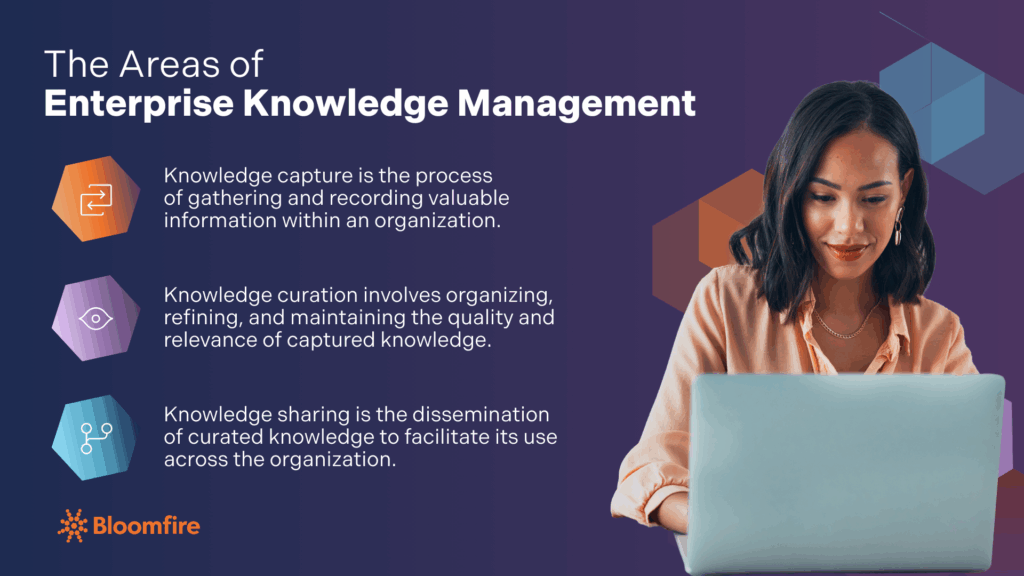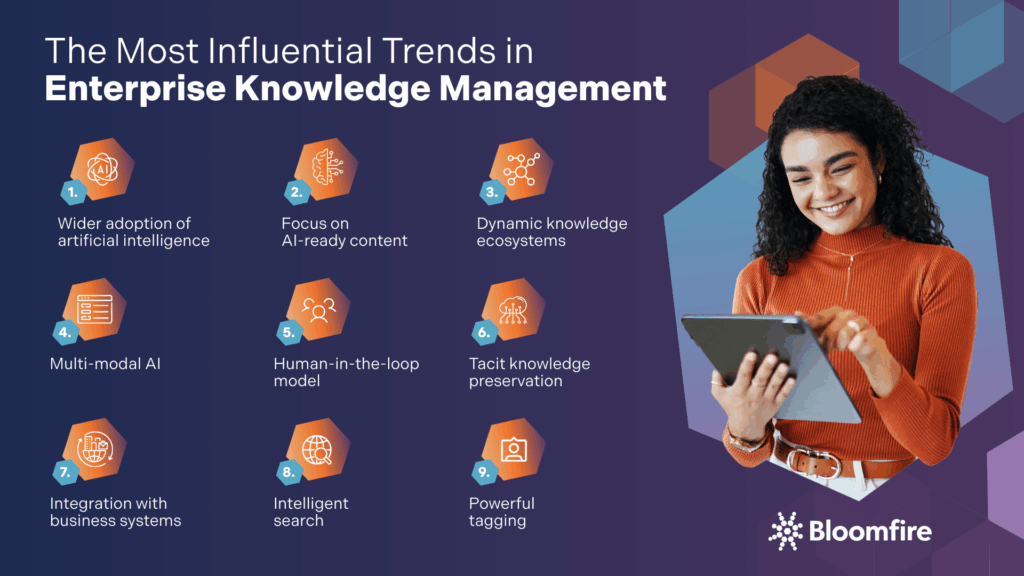What Is Enterprise Knowledge Management? –Definition, Benefits, Practices, & Trends

Today’s enterprises face the challenge of growing amidst evolving obstacles like talent shortages and economic uncertainty, requiring the use of all available tools. Company-wide knowledge can be a crucial strategic asset, encompassing protocols, systems, practices, and employee expertise.
While abundant, the challenge lies in organizing and retrieving this knowledge efficiently. Therefore, enterprise knowledge management systems are vital to transform knowledge sharing into a significant strategic advantage. Learn more about what enterprise knowledge management is and how to maximize its benefits in your organization.
What Is Enterprise Knowledge Management?
Enterprise knowledge management (EKM) refers to your organization’s strategic approach to capturing, distributing, and effectively utilizing knowledge. It encompasses the processes and systems that ensure valuable information and expertise within your business are shared and leveraged to achieve organizational goals.
Enterprises possess a large amount of internal and external knowledge, and enterprise knowledge management is the process of organizing, curating, and retrieving this information in a user-friendly way. EKM helps prevent knowledge silos and also helps ensure that knowledge isn’t lost in an organization.
Splunk’s global survey of 1,300+ decision makers found that 60% reported that at least half their data was dark, and a third said it was 75% or higher. EKM enables information to be leveraged by the people who need it most, which is one of the biggest benefits of a knowledge base.
The Value of Enterprise Knowledge Management
Your organization’s ability to adapt and respond to change is paramount. This is especially true now that business technology advances quickly, and could underpin an organization’s success. EKM plays a key role in enabling this agility by ensuring that your team has access to the right information at the right time, facilitating quicker and more informed decisions.
Furthermore, EKM helps in retaining critical knowledge within your organization. As employees retire or move on, there is a risk of losing valuable insights and expertise. Through a KM system built for the enterprise, you create a repository of knowledge that can be accessed by current and future employees, reducing the impact of employee turnover and ensuring continuity.
In addition, EKM enhances innovation by fostering a culture of collaboration and utilizing knowledge-sharing solutions. When employees have access to a wealth of information and are encouraged to share their insights, ideas can flow more freely, leading to creative solutions and improved processes. This not only drives competitive advantage but also creates an engaging work environment where employees feel valued and motivated.
Power Move: Expand your understanding of the unequivocal importance of enterprise knowledge management by deep diving into its value in Enterprise Intelligence. Knowledge management is one of the three pillars of Enterprise Intelligence. Thus, to maximize its influence, you must establish its connection with the other pillars (enterprise search and business intelligence).
What Are the Areas of Enterprise Knowledge Management?
Enterprise knowledge management is a comprehensive system with three key areas: knowledge capture, curation, and sharing. Learning how these parameters work together isn’t just a nice-to-have anymore, but an essential task for any organization aiming to succeed in today’s business landscape. When these pieces connect, they spark new ideas, make things run smoother, and pave the way for long-term success. We go over them in detail below.

1. Knowledge Capture
Knowledge capture refers to how knowledge is collected, particularly tacit knowledge, which is gained through lived experience but can be difficult to articulate. Excellent leadership skills are an example of tacit knowledge in the workplace.
In reference to enterprise knowledge management, knowledge capture is how information is collected and turned into something that can be used by others who wish to learn from it. This can involve anything from documenting best practices after a project wraps up to recording expert insights during a brainstorming session.
2. Knowledge Curation
Not everyone needs the same details in an enterprise organization, which is where knowledge curation comes into play. Knowledge curation is the process of organizing knowledge and presenting it in a way that makes it easy for people to navigate, so they can consume information that’s relevant to them.
For instance, imagine a company launching a new software. The knowledge curation process might involve creating a well-structured FAQ document, short video tutorials categorized by specific features, and a searchable glossary of terms, all housed on an easily accessible internal platform.
3. Knowledge Sharing
When knowledge is buried in a cluttered inbox or tucked away into stuffed filing cabinets, it will not be useful, even if the content itself is excellent. Knowledge sharing refers to how knowledge is distributed across the enterprise organization.
Knowledge sharing should be done in a way that is efficient, relevant, and organized. For example, someone going through onboarding should easily access their onboarding materials, while a customer support agent should also be able to search for the answer to a customer query.
Why connecting the three areas of EKM matters
Neglecting any one of the three areas of EKM weakens the entire system. Without effective capture, there’s little valuable knowledge to leverage–without proper curation, the knowledge becomes overwhelming and unusable–and without robust sharing mechanisms, valuable insights remain siloed.
Customize knowledge capture, curation, and sharing to your organization’s culture, structure, and goals. This approach ensures the system meets your needs, empowers employees to learn and innovate, and fosters a lasting competitive edge.
How Does Enterprise Knowledge Management Benefit Your Business?
How exactly does enterprise knowledge management benefit a business? In general, enterprise knowledge management democratizes information and makes it highly accessible, so anyone can swiftly use it. This advantage can significantly enhance your organization’s performance and efficiency. Let’s go over the benefits below.
1. Boosts collaboration and use of collective knowledge
Enterprise knowledge management empowers employees by providing seamless access to the organization’s collective intelligence. This benefit of EKM enables them to perform tasks more efficiently and make well-informed decisions grounded in shared expertise.
EKM fosters a culture of collaboration where employees can readily contribute their knowledge and insights. In turn, it leads to a greater sense of impact and significantly boosts job satisfaction through shared success and continuous learning.
2. Promotes workplace independence
Employees can be self-sufficient when looking for information and answers, and they don’t need to rely on the assistance of their colleagues frequently. Let’s say a team leader is working on a presentation for their department head, and they need to find out what the organization already knows about how their customers are using a certain product.
That employee can turn to their business enterprise knowledge management solution to swiftly find the answer instead of asking a colleague (which can be a slower process, requiring work from that colleague). EKM ultimately helps free up resources because employees are not reliant on one another for answers.
3. Creates process consistency
Enterprise knowledge management also benefits a business by creating consistency around details. There might be a consistent and dedicated way of executing a task in a company, but that knowledge might not be widely shared.
For example, if the employee handbook is buried or hard to find, your team won’t waste time chasing it down; they’ll just skip the style guide and hit send. When knowledge is centralized and accessible, it can be consistent across the board.
4. Allows quick access to information
Enterprise knowledge management allows employees to find the answers they’re looking for quickly and can improve productivity in a business. According to McKinsey & Company, employees spend 20% of their time searching for needed resources. Thanks to EKM, employees can get that valuable time back because the information is readily available.
Did You Know? Our data shows that employees can save as much as 3.9 hours per week from searching for information using an advanced knowledge management system like Bloomfire. Learn more about this data and other insights from our The Value of Knowledge Management report.
5. Improves internal communication
Enterprise knowledge management can help improve communication by preventing knowledge silos, which can be a potential workplace communication issue. For example, on-demand access to knowledge can help keep a cross-department project moving forward and prevent delays in exchanging information when team members work in different locations or time zones.
When knowledge is centralized, everyone can work together better. Sharing knowledge empowers action, adding value and improving outcomes, unlike the limited impact of isolated information. Eliminating silos and building trust with partners, this shared knowledge equips everyone to perform effectively, leading to efficiency and innovation.
How to Adopt Enterprise Knowledge Management
Enterprise knowledge management can be a powerful tool for businesses, transforming scattered information into a strategic asset that drives growth and innovation. However, you can only achieve this if you create a system that allows your teams to take action and foster a culture of continuous learning. Here are the steps to start adopting an enterprise knowledge management strategy for your organization.
1. Seek assistance from colleagues
Leaders should solicit assistance from employees since much of the necessary knowledge either lives with them or is used by them. You can ask your employees via a survey what data or information they want to see incorporated into the enterprise knowledge management system and what knowledge they feel is inaccessible or buried when needed. You can also host a meeting at the beginning of every project, where everyone on the team involved can share their knowledge related to the project.
2. Hold brainstorming sessions
Businesses can host brainstorming sessions where colleagues can share ideas and thoughts in an open forum. This type of session is great for collaboration and can be an excellent way to crowdsource solutions and ideas internally. After brainstorming sessions, the shared information can be recorded in the business’s knowledge management system so anyone can refer to it anytime.
3. Collect new ideas from your staff
Additionally, because team members are bound to develop excellent new ideas, there should be a process around collecting them to execute enterprise knowledge management. Leaders can keep employees engaged by encouraging them to share ideas and prompting them to ask questions so that others can respond with new ideas. Concepts can be shared through text and other rich media (such as videos or images), which can then be uploaded to the business’s knowledge management system.
4. Provide a collaborative workspace
Another practice businesses can adopt to apply enterprise knowledge management is ensuring there are workspaces for collaboration. Collaborative workspaces can be physical if a team is in the same space or virtual if a team is hybrid or remote.
Either way, collaborative workspaces can include colleagues from different departments and be an excellent place to nurture ideas. After collaborative workspace sessions, the items discussed can be uploaded in a digital format into the knowledge management system.
Enterprises need to consider a system to reap the full benefits of enterprise knowledge management. The goals and uses outlined above can be considered when choosing the right knowledge management system.
Best Practices for Effective Knowledge Management in Businesses
Establishing a thriving knowledge management ecosystem requires a thoughtful and consistent approach. Several best practices can guide businesses in creating a system that captures, curates, and shares valuable insights. These practices include the following:
- Clearly define your knowledge management goals. What specific business challenges are you trying to solve? What knowledge assets are most critical to your success? Understanding your why will inform every subsequent step.
- Cultivate a culture of knowledge sharing and collaboration. This involves encouraging collaboration, recognizing and rewarding knowledge contributors, and making it easy for employees to both access and share information. Leadership buy-in and consistent communication are also essential to cultivate this environment.
- Implement user-friendly technology. The right software and tools are your first line of mobilization when implementing a knowledge management strategy. This technology includes platforms for document management, collaboration tools, knowledge bases, and potentially AI-powered systems for knowledge discovery.
- Establish clear processes for knowledge capture, curation, and sharing. Consider how knowledge will be captured from various sources (e.g., project post-mortems, expert interviews), how it will be organized and validated, and through which channels it will be made accessible to the relevant stakeholders. Periodic review, like knowledge audits, and refinement of these processes ensure their ongoing effectiveness.
- Measure and evaluate the effectiveness of your KM initiatives. Track key KM metrics such as knowledge base usage, time saved through access to information, and the impact of knowledge sharing on innovation or problem-solving. Regularly solicit feedback from users to understand their needs and challenges.
Effective knowledge management is not a one-time implementation but an ongoing journey of cultivation and adaptation. Embracing these recommended approaches and adapting your strategy to your organizational needs allows you to convert knowledge from a passive asset into a potent catalyst for enduring progress and a strong market position. Plus, integrating the key trends in EKM will likely drive a favorable KM return on investment (ROI).
9 Trends in Enterprise Knowledge Management
The landscape of enterprise knowledge management is undergoing significant transformations, primarily driven by the rapid advancements in artificial intelligence (AI). One of the most prominent KM trends is the increasing integration of AI and machine learning to automate various KM processes, such as intelligent information retrieval, predictive analytics, and knowledge curation.

Along with AI augmentation, here are some of the key trends in enterprise knowledge management:
1. Wider adoption of artificial intelligence
AI is being integrated for intelligent search, automation of routine tasks, personalized knowledge delivery, and enhanced decision-making through predictive insights. AI-powered knowledge management systems can cut information search time by as much as 35%, according to the McKinsey Global Institute. As a result, employees can increase productivity by 25% and spend more time focusing on strategic initiatives and innovation.
2. Focus on AI-ready content
Ensuring knowledge is accurate, well-structured, and understandable for AI systems to maximize their effectiveness. Producing AI-ready knowledge also increases confidence in the KM system, improving its overall efficiency. In doing so, choosing a KMS with a self-healing database is imperative, wherein it pinpoints missing information, flags stale or contradictory data, and automatically streamlines its content by eliminating redundancies and trivialities.
3. Dynamic knowledge ecosystems
Moving from static repositories to living intelligence systems that are continuously evolving and adapting to user needs. This is where Enterprise Intelligence comes into the picture. Enterprise Intelligence is a strategic framework that leverages AI to transform organizational knowledge into actionable insights, driving better decision-making and improved collaboration.
4. Multi-modal AI
Integrating data from various formats like text, images, audio, and video for richer knowledge experiences. This diversity enables a more comprehensive understanding and facilitates varied learning styles within the organization. Imagine instantly accessing a video tutorial alongside a text-based explanation or hearing a subject matter expert’s commentary on a relevant image, significantly enhancing knowledge absorption and application.
5. Human-in-the-loop model
The human-in-the-loop (HITL) approach ensures that AI systems are guided and validated by human insights, particularly for complex or nuanced tasks. It recognizes the continued importance of human expertise and judgment in AI-driven processes. In turn, it maximizes the efficiency of AI while leveraging the critical thinking and contextual understanding that humans uniquely provide. This symbiotic relationship leads to more reliable and trustworthy knowledge outcomes.
6. Tacit knowledge preservation
This trend involves implementing strategies and tools to capture and share employees’ experience-based insights (tacit knowledge). Tacit knowledge constitutes roughly 90% of an organization’s total knowledge. Therefore, effectively preserving and converting it to other types of knowledge fosters a culture of continuous learning and allows new employees or those facing novel challenges to benefit from the hard-earned wisdom of their colleagues.
7. Integration with business systems
Embedding KM systems directly into the daily workflows and applications that employees already use ensures that knowledge is readily available without requiring them to switch contexts or learn new platforms. When knowledge is accessible, it fosters a culture of knowledge utilization, making it a natural part of how work gets done.
8. Intelligent search
Leveraging advanced search capabilities increases understanding of context and user intent, making it a significant trend in enterprise knowledge management. This also includes utilizing interconnected information networks to provide context-rich responses and improve AI’s understanding. Such intelligent search functionalities move beyond simple keyword matching, enabling users to find relevant information more efficiently and effectively, even with ambiguous queries.
9. Powerful tagging
Utilizing effective tagging strategies to categorize and retrieve knowledge assets efficiently is becoming increasingly crucial for modern EKM systems. Powerful tagging enables more granular organization of information, allowing users to pinpoint specific knowledge with greater accuracy and speed, ultimately enhancing overall knowledge discoverability and utilization across the enterprise.
According to a survey by McKinsey & Company, over three-quarters (78%) of organizations report using AI in at least one business function, up from 72% in early 2024 and 55% the previous year. As technology continues to evolve, so will the field of enterprise knowledge management. Staying abreast of future trends will help ensure your EKM system remains relevant and effective.
A Complete Enterprise Knowledge Management System
What if your organization’s collective wisdom could be instantly accessible and effortlessly shared without using many tools? It can happen through a knowledge management system that provides all the capabilities to facilitate all the domains of enterprise knowledge management.
With Bloomfire, for example, you can utilize a comprehensive suite of tools essential for effective EKM. It provides a centralized platform seamlessly integrating knowledge capture, curation, and sharing.
For instance, its robust content creation and import features facilitate easy knowledge capture from various sources. Intelligent search and categorization functionalities ensure effective knowledge curation, making information readily discoverable. Finally, versatile sharing options, and features like Q&A, forums, and expert location, promote widespread knowledge dissemination and application across the organization.
Key collaborative tools like Slack and Microsoft Teams can be integrated, allowing teams to access and share Bloomfire’s knowledge base directly within their familiar communication channels. This eliminates the friction of switching between multiple applications and ensures that critical information is readily available within ongoing conversations and projects.
Bloomfire checks the boxes for the knowledge base, collaboration platforms, and document management system. With these core EKM tools, Bloomfire empowers organizations to build a truly connected and knowledge-driven ecosystem.
Transform Your Business With Enterprise Knowledge Management
Enterprise Knowledge Management is a vital component of modern business strategy. Understanding what EKM is and implementing an effective system enhances decision-making, fosters innovation, and provides a competitive edge.
To fully leverage the benefits of enterprise knowledge management, start by evaluating your current knowledge management practices and identifying areas for improvement. Explore tools and technologies that can enhance your EKM system and foster a culture of collaboration. Stay informed and adaptable to ensure your EKM system continues to drive success.
Centralized knowledge for every team
Collect, connect, and democratize knowledge and insights!
Get a Demo!

A SharePoint Alternative That Unlocks Enterprise Intelligence

What Is Enterprise AI Search? (And Why Your Business Needs It)

The Value in Knowledge Sharing Sessions

Start working smarter with Bloomfire
See how Bloomfire helps companies find information, create insights, and maximize value of their most important knowledge.

Take a self guided Tour
See Bloomfire in action across several potential configurations. Imagine the potential of your team when they stop searching and start finding critical knowledge.